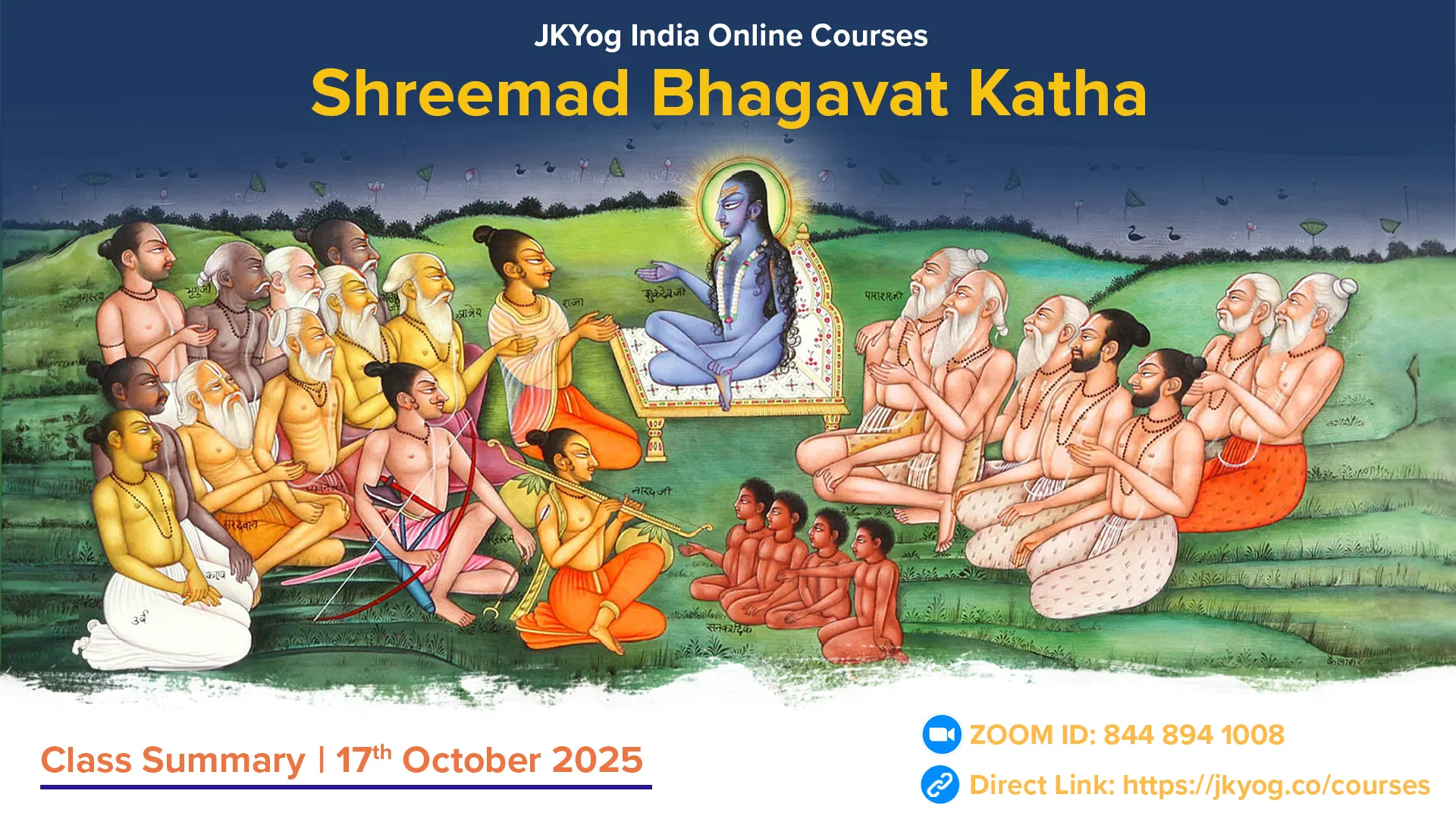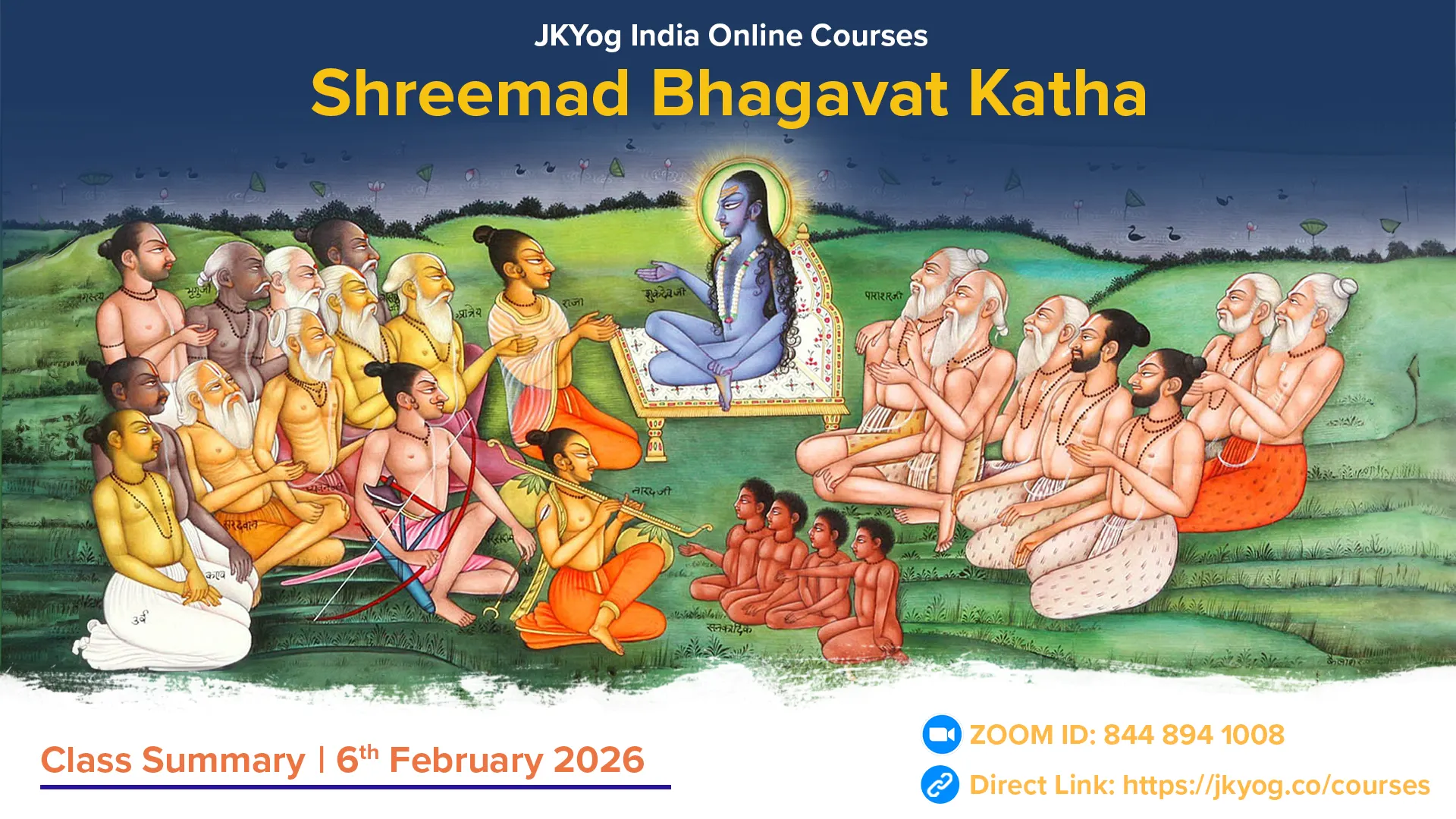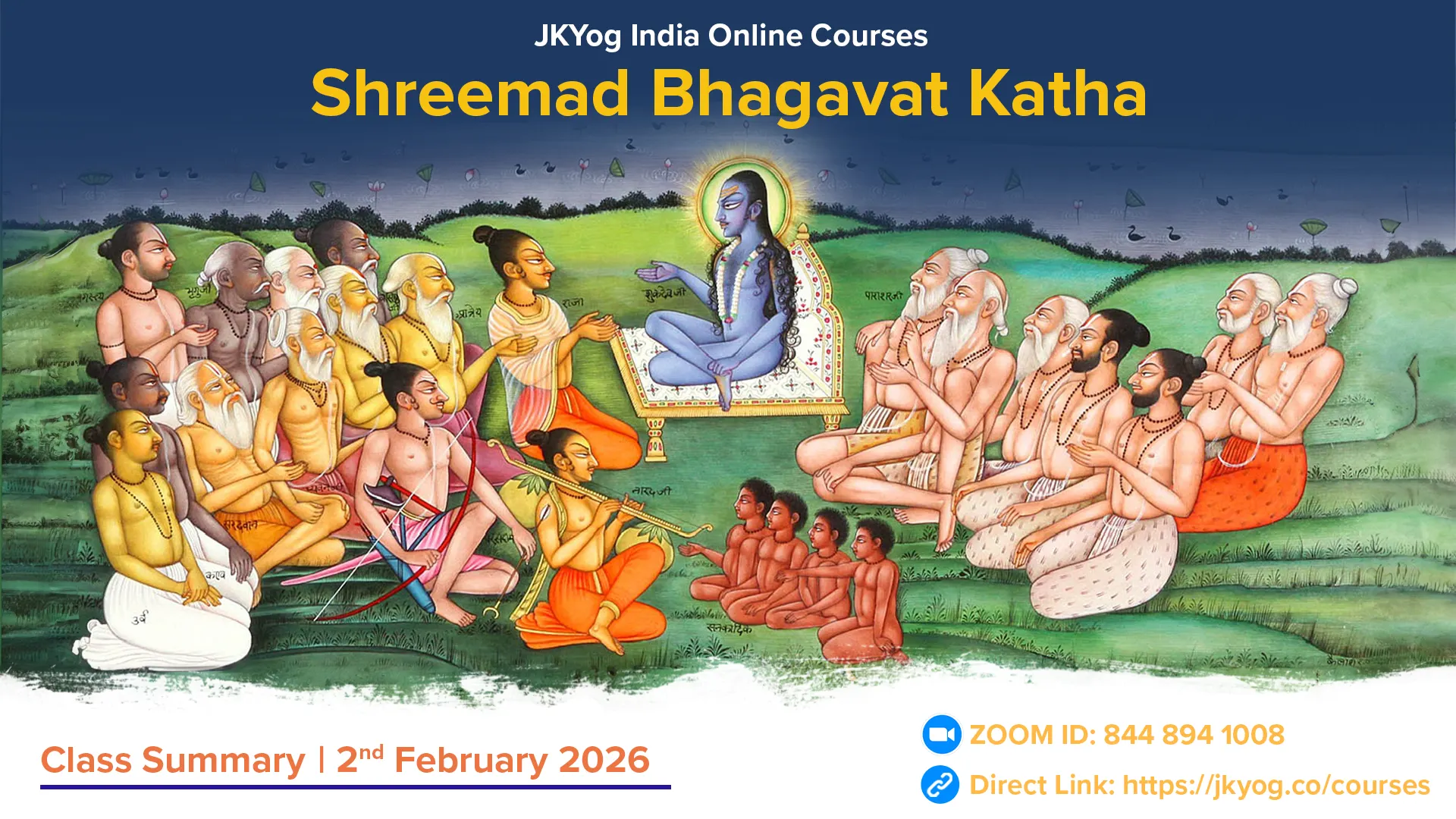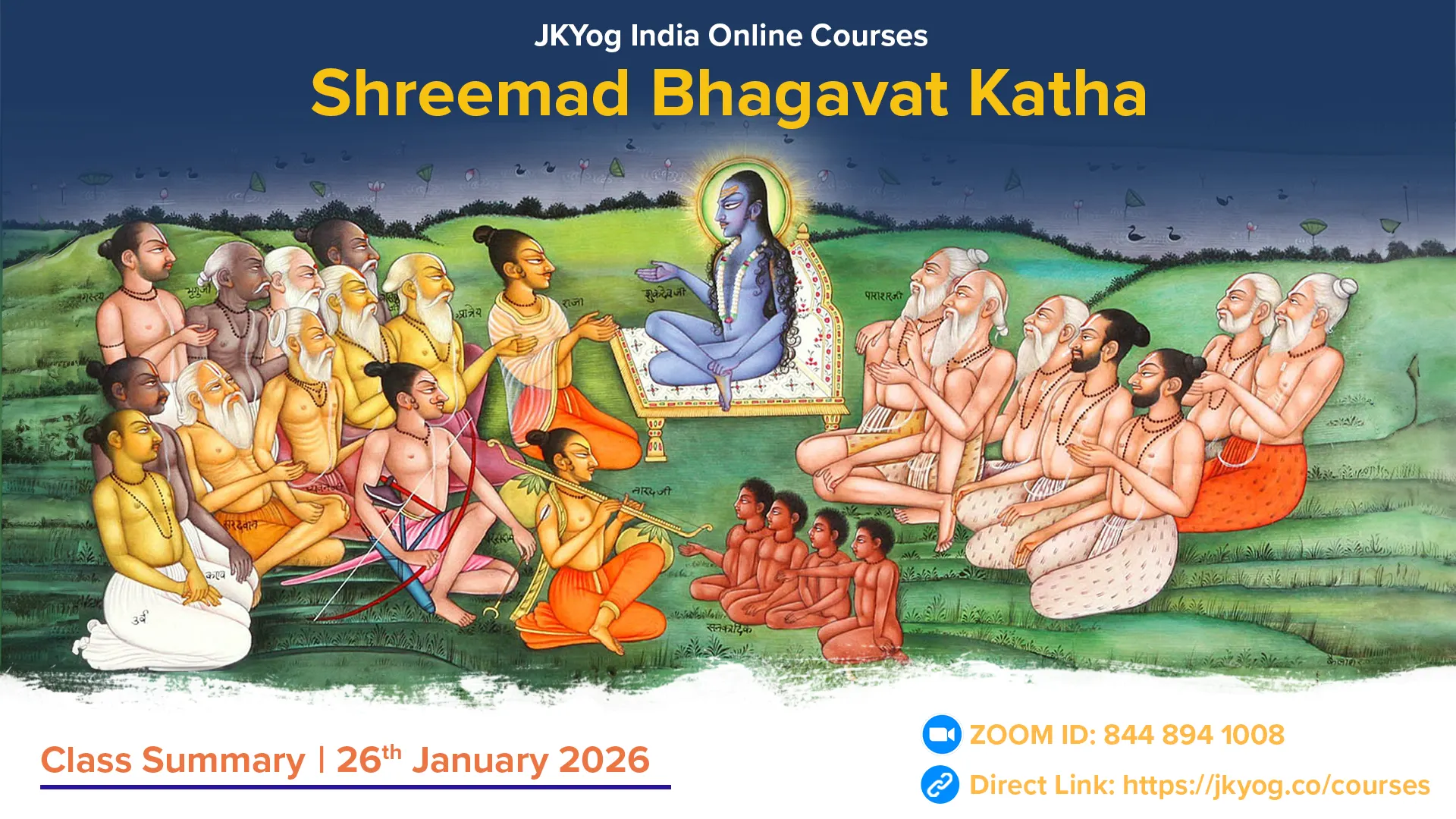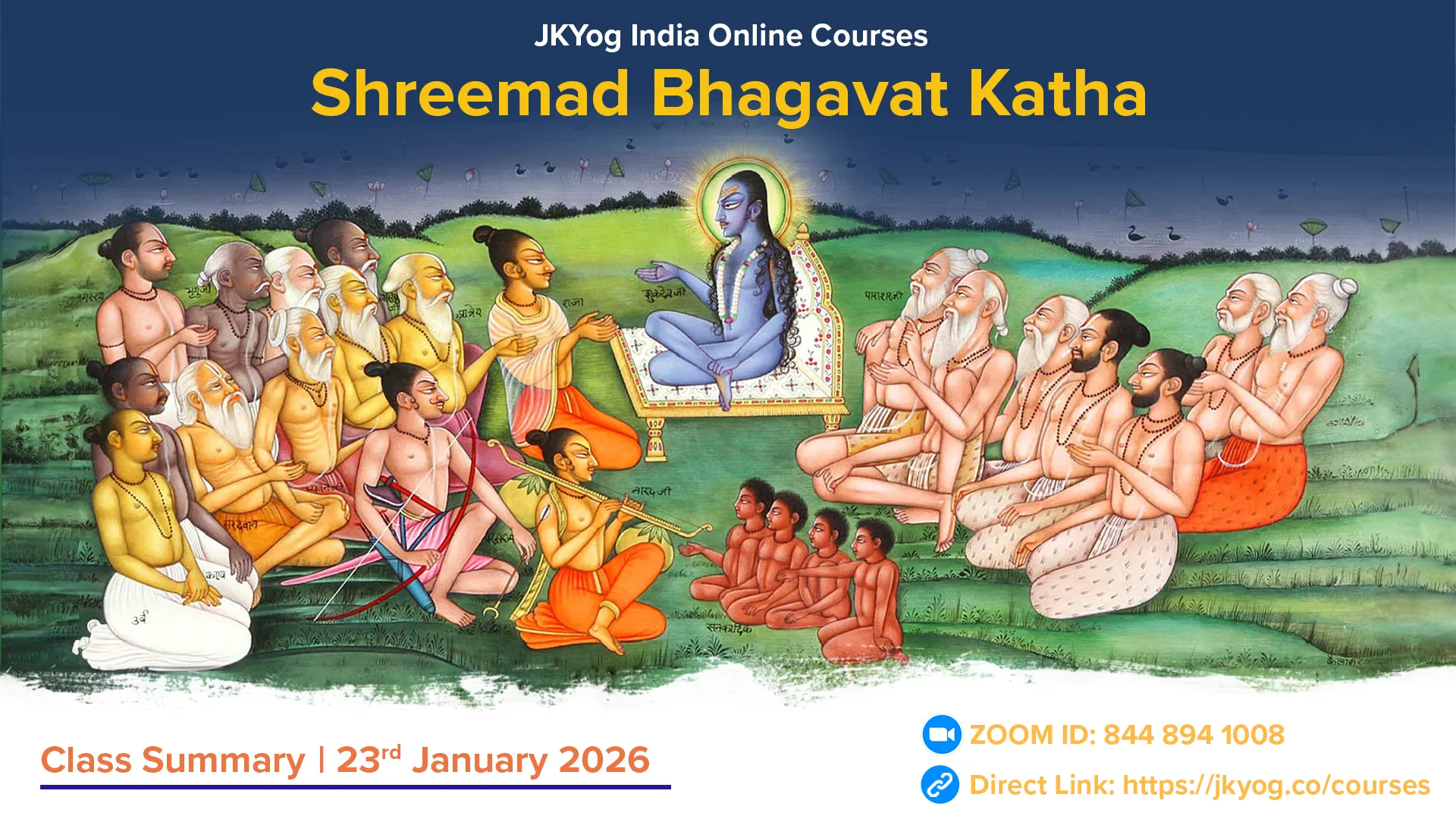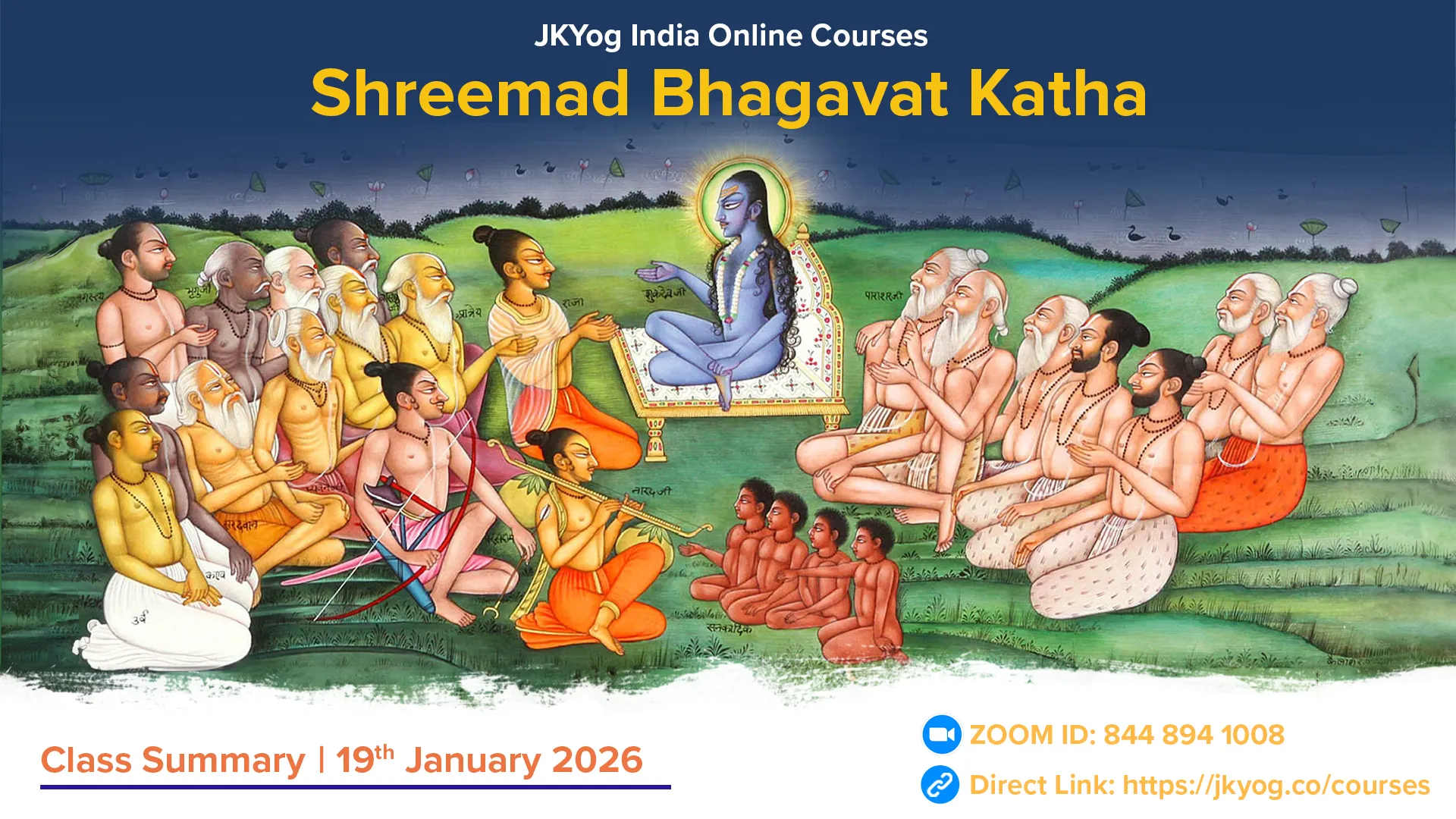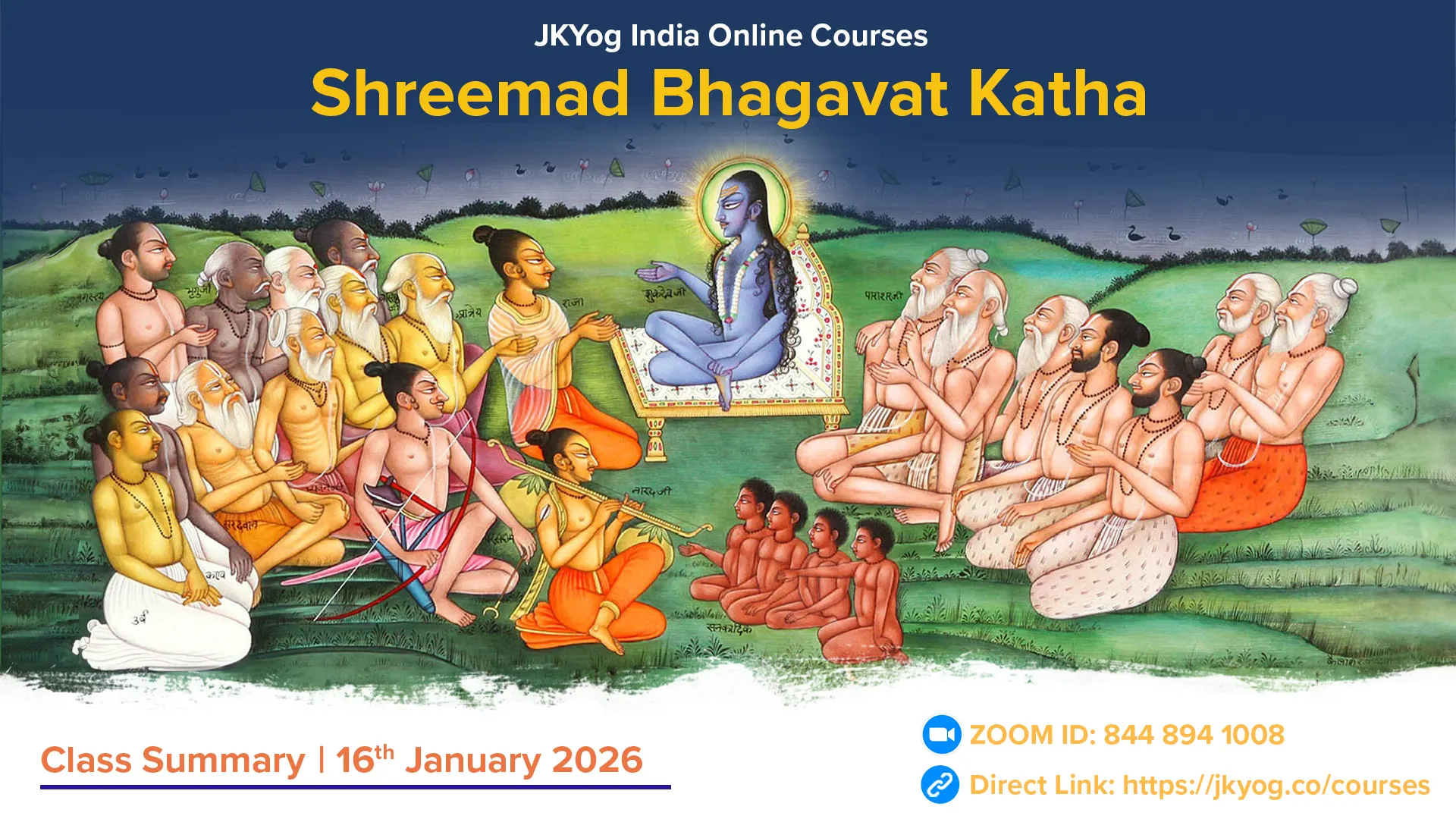Shreemad Bhagavat Mahapuran- Canto: 10, Chapters: 4-5
As Shukdevji speaks to Parikshit, the divine play unfolded in the hush of the night. Vasudevji had safely carried baby Shree Krishna to Nand’s house in Gokul and then returned to Mathura with Yashoda’s newborn daughter, Yogmaya, in his arms. The moment he entered the city, the great gates shut of their own accord.
When he reached the prison, Vasudevji gently placed the infant in Devkiji’s lap. Hardly had he sat when the baby girl cried out. Her cry pierced the night and roused the sleeping gatekeepers, who sprang up and ran to Kans with the news: “Devkiji has given birth!” Kans was seized with alarm and restlessness.
Hearing this, Kans leapt from his bed and dashed toward the confinement chamber, thinking, “This time my death has been born.” He ran with his hair undone and stumbled several times along the way. When he reached the prison, Devkiji, overcome with sorrow, pleaded with him: it was a daughter, a female child, and he must never kill a woman. “Brother,” she said, “by destiny you have already slain many radiant sons of mine. Now only this one daughter remains; please give her to me. Grant this final child to your unfortunate sister.”
Concealing the girl in her lap, Devkiji begged him, tears streaming down her face. But Kans was cruel. He rebuked Devkiji, snatched the infant from her arms, seized the tiny newborn by the feet, and with brutal force hurled her against a rock. Selfishness had uprooted every trace of compassion from his heart. Yet that little sister of Shree Krishna was no ordinary child; she was a devi. As she slipped from his grasp, she rose immediately into the sky and appeared with eight mighty arms bearing weapons.
Adorned with a divine garland, fine garments, sandalwood and jewel-like ornaments, she held a bow, trident, arrow, shield, sword, conch, discus and mace. Siddhas, charanas, gandharvas, apsaras, kinnaras and the naga hosts presented offerings and sang her praise. Then the goddess addressed Kans: “O fool! What will you gain by killing me? The enemy of your previous birth has already been born to destroy you. Cease killing innocent children in vain.”
Having spoken thus, Bhagwati Yogamaya vanished and manifested in many places on earth under different names.
Kans stood astonished. Immediately, he freed Devkiji and Vasudevji from prison and, humbled, said, “Sister Devkiji, brother-in-law, I am a great sinner. Like a demon who slays his own children, I have cruelly killed many of your sons. I feel deep remorse. I had grown so hard that no mercy remained in my heart. I abandoned my family and well-wishers; now I know not which hell awaits me. Though I live, I am as one dead. Sometimes even fortune deceives. Trusting that, I slew your innocent children. I am indeed a great sinner. Forgive my cruelty, for you are compassionate and noble and protect the meek.”
He fell at their feet and wept. Believing Yogamaya’s words, he released them fully and showed them affection. Seeing Kans repentant, Devkiji forgave him and forgot his former crimes. Vasudevji, smiling, told Kans, “Brother Kans, beings through ignorance mistake the body and senses for ‘I’ and ‘mine’. From that arises the division of friend and foe, and with that division come grief, joy, fear, hatred, greed, attachment and pride. Thus, they fail to see that the one inspirer of all, Bhagwan, moves from one mood to another, causing birth and dissolution.”
After speaking to Kans, Vasudevji and Devkiji obtained his permission and returned to their palace. When night passed, Kans summoned his ministers and related all that Yogamaya had said.
Kans’s ministers were no wise counsellors; they were asuras and naturally hostile to the devas. Hearing their king, they grew yet more enraged and counselled him, “O King Bhoja, if this is so, we shall kill children everywhere in cities and villages, in herdsmen’s settlements, whether ten days old or younger. The devas tremble at war and at the sound of your bow. They are brave only where there is no conflict. Appoint our trusted asuras so we may uproot them. The root of the devas is Vishnu, and Vishnu dwells where Sanatan Dharm is established. Its roots are the Vedas, cows, brahmins, tapas and yajna. We must destroy these brahmins, ascetics, yajna-rituals and the cows given to yajna. Brahman, cow, Veda, tapas, truth, control of the senses, faith, compassion, and yajna are all the body of Vishnu. To strike Vishnu, we must first slay the rishis.”
Kans’s reason had already been clouded, and his ministers were worse. Taking their counsel, the death-bound asura Kans resolved to kill the brahmins. He sent violent rakshasas, who could assume any form, to attack the saintly men. After they dispersed, Kans returned to his palace.
Those asuras were rajoguni by nature. Because of tamogun, their minds had lost all discernment between right and wrong; death seemed to dance above their heads. Hence, they came to hate the saints.
Shukdevji concludes to Parikshit that those who show disrespect to great saintly persons bring about their own ruin, their lifespan, wealth, fame, dharm, welfare in this world and the next, sensual enjoyments and every means of their well-being are destroyed by such wicked deeds.
The Nand Utsav in Gokul
Nandbaba was a noble, generous, and self-controlled man. When a son was born in his house, his heart overflowed with joy. After taking a purifying bath, he dressed in clean, elegant clothes and adorned himself with ornaments. He invited learned Brahmins who knew the Vedas to chant auspicious mantras and perform his son’s jatakarma sanskar (birth ceremony). Along with that, he also arranged worship for the devas (gods) and pitras (ancestors).
In his joy, Nandbaba donated two hundred thousand cows to the Brahmins, each cow decorated with fine clothes and ornaments. He also gave away seven mounds of sesame grains, covered with jewels and golden cloths, as charity.
It is said that different things are purified in different ways:
New water or land is purified by the passing of time.
- The body by bathing.
- Clothes by washing.
- The womb by sanctifying rites.
- The senses by penance.
- The Brahmins by yajna.
- Wealth by charity.
- The mind by contentment.
- But the true purification of the soul happens only through self-knowledge.
At that time, the Brahmins, Soots, Magadhas, and bards offered their blessings and sang songs of praise. Singers began to sing; drums and trumpets resounded again and again. The whole of Gokul was filled with joy and celebration.
Every house in BrajMandal was drenched in festive colours. The courtyards, doors, and inner chambers were cleaned and sprinkled with fragrant water. Colourful flags, flower garlands, beautiful fabrics, and leafy decorations adorned every home. The cows, bulls, and calves were also decorated and anointed with turmeric and oil, and adorned with ochre markings, peacock feathers, flower garlands, silken cloths, and golden chains.
All the cowherds dressed in fine clothes, ornaments, tunics, and turbans, and carrying gifts in their hands, went to Nandbaba’s house. When the Gopis heard that Yashodaji had given birth to a son, their hearts filled with happiness, they quickly dressed in beautiful clothes and ornaments, applied kohl to their eyes, and adorned themselves with care. Their faces glowed like blooming lotuses, and the vermilion on their foreheads shone like saffron threads from lotus flowers.
Carrying gifts, they set out for Yashodaji’s home. As they walked, the necklaces on their necks, earrings in their ears, and bangles on their wrists sparkled. The flowers in their hair swayed and fell as they moved with graceful enthusiasm. Their radiant presence on the way to Nandbaba’s house was a sight to behold, as if all the beauty of Braj itself had taken form in the Gopis.
When they reached, they blessed the newborn child, saying, “May he live long! O Bhagwan, protect him!” They sprinkled water mixed with turmeric and oil on everyone and sang auspicious songs in loud, joyous voices.
When Bhagwan Shree Krishna, the Lord of the entire universe, appeared in Nandbaba’s house in Braja, a wondrous celebration arose. The whole land of Braj danced with joy, filled with the sound of festive drums and conches. The cowherds, overjoyed, began playfully throwing curd, milk, ghee, and water at one another. Some smeared butter on each other’s faces, others flung it around. The entire atmosphere overflowed with love, laughter, and divine bliss.
Generous by nature, Nandbaba gifted clothes, ornaments, and many cows to the cowherds. He also lavished gifts on the Soots, Magadhas, bards, dancers, and musicians who made their living through art and performance. His only intention was that through all these acts, Bhagwan Vishnu would be pleased, and his newborn son Shree Krishna would be blessed with auspiciousness and protection.
As people arrived to congratulate Nandbaba, Rohiniji, adorned with fine clothes, garlands, and ornaments, graciously welcomed and honoured the women like a true lady of the house. That day, the entire Braj Mandal was filled with joy, music, and love.
From that day onward, prosperity and divine grace took residence in Nandbaba’s Braj. Because of Shree Krishna’s presence, the place became a playground of Lakshmi Devi herself, as though fortune and abundance had chosen to dwell permanently in Braj.
Some time later, Nandbaba entrusted the care of Gokul to the other cowherds and himself set out for Mathura to pay the annual taxes to King Kans.
Meeting of Nandbaba and Vasudevji
When Vasudevji heard that his brother Nand had come to Mathura and had already paid the annual tax, he immediately went to meet him. The moment Nandbaba saw Vasudevji, he rose with joy, as if life had returned to a lifeless body. He embraced his brother warmly, his heart overflowing with affection and happiness.
Nandbaba welcomed Vasudevji with honour, offered him a seat, and began to inquire about his well-being. He said, “Brother, you had reached an age when hope for children had nearly faded, yet by divine grace, you have now been blessed with a son. What great fortune! And today, the two of us have met again, that too is God’s mercy. Just as straws and boats cannot stay together in the swift current of a river, so too, our own people cannot always remain together; everyone moves according to his own destiny.
The great forest (Mahavan) where you now live, does it have enough water, grass, and vines for your cattle? Is the place safe from disease or danger? My son Balram, who stays with you along with his mother Rohini, must be growing well under your love and care, along with Yashodaji. He must regard you as his own parents. For human beings, those acts of Dharma, Artha, and Kama are worthwhile that bring happiness to one’s own people. Any deed done merely for one’s own gain but causing sorrow to loved ones is of no value.”
Nandbaba replied, “Brother Vasudev, Kans cruelly killed many of your sons born of Devkiji’s womb. In the end, only a daughter remained, and even she ascended to heaven. Truly, happiness and sorrow both depend on destiny. Fate alone is the greatest support of the living being. One who understands this truth is never disturbed by the changing events of life.”
Then Vasudevji said, “Brother, you have paid the tax, and we have met as well. Now, do not delay. Return soon, for some inauspicious events have recently begun to occur in Gokul.”
Hearing Vasudevji’s words, Nandbaba and the other Gopas took their leave. They mounted their bullock carts and began their journey back toward Gokul.
Summary: JKYog India Online Class- Shreemad Bhagavat Katha [Hindi]- 17.10.2025

